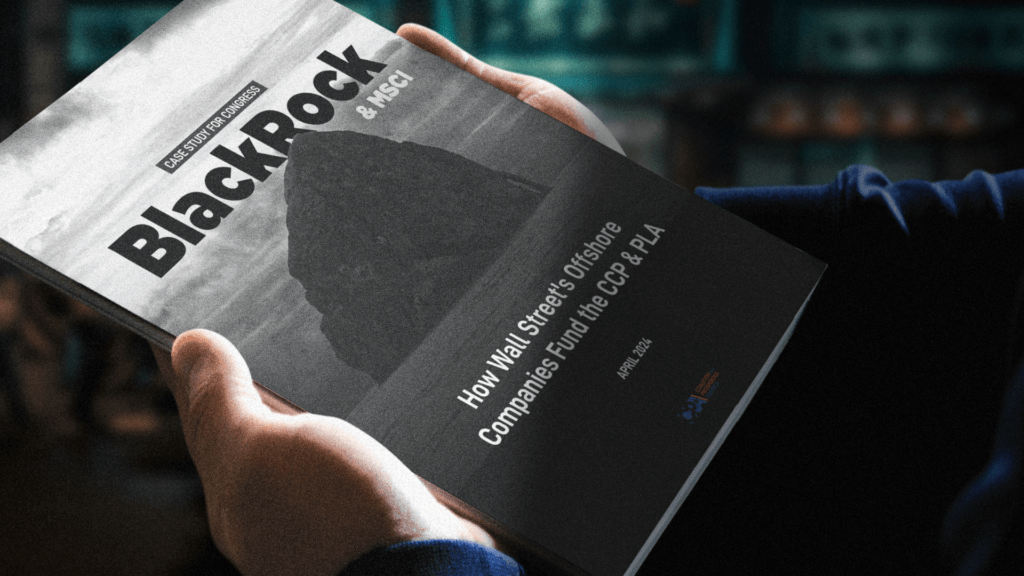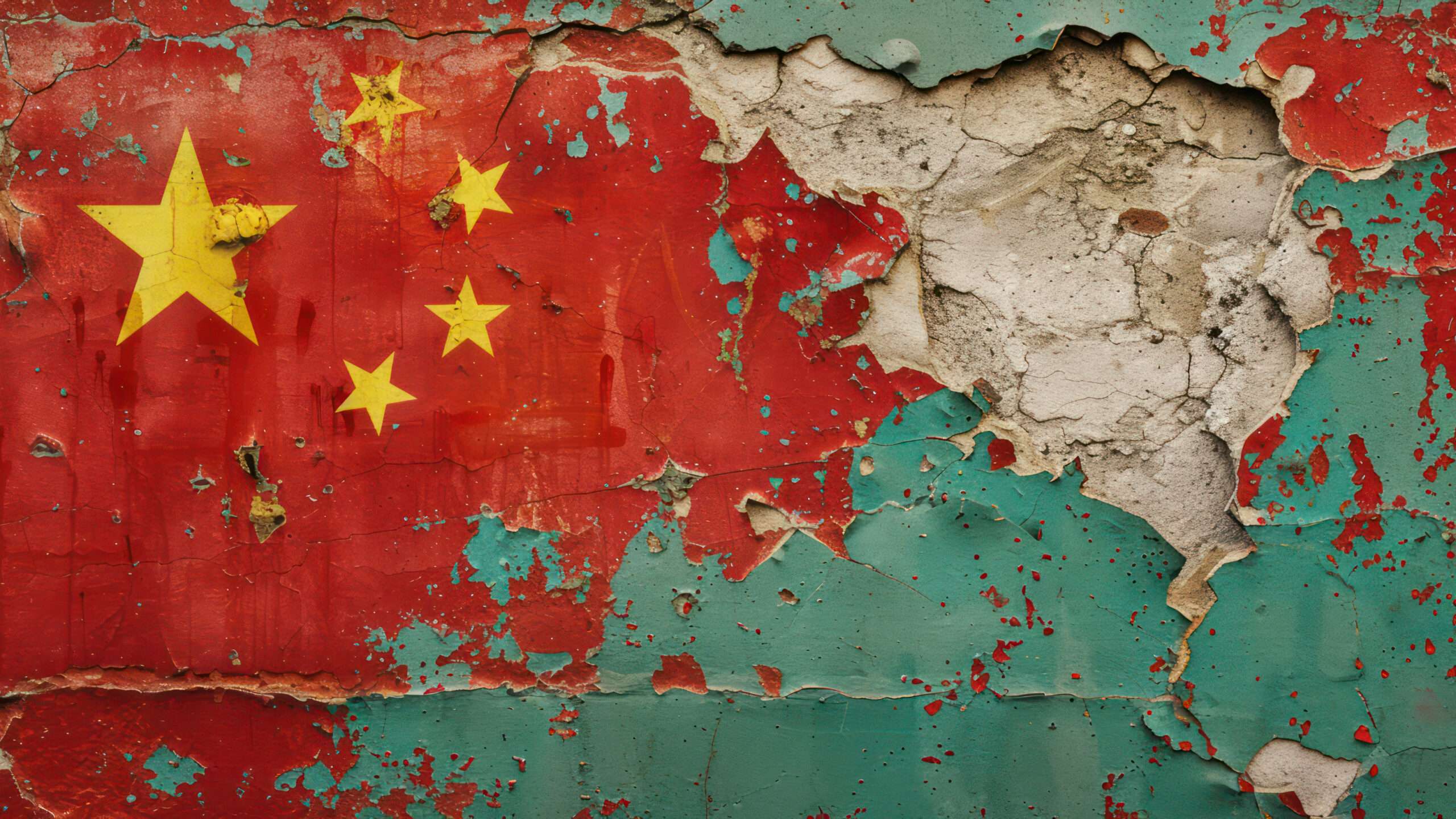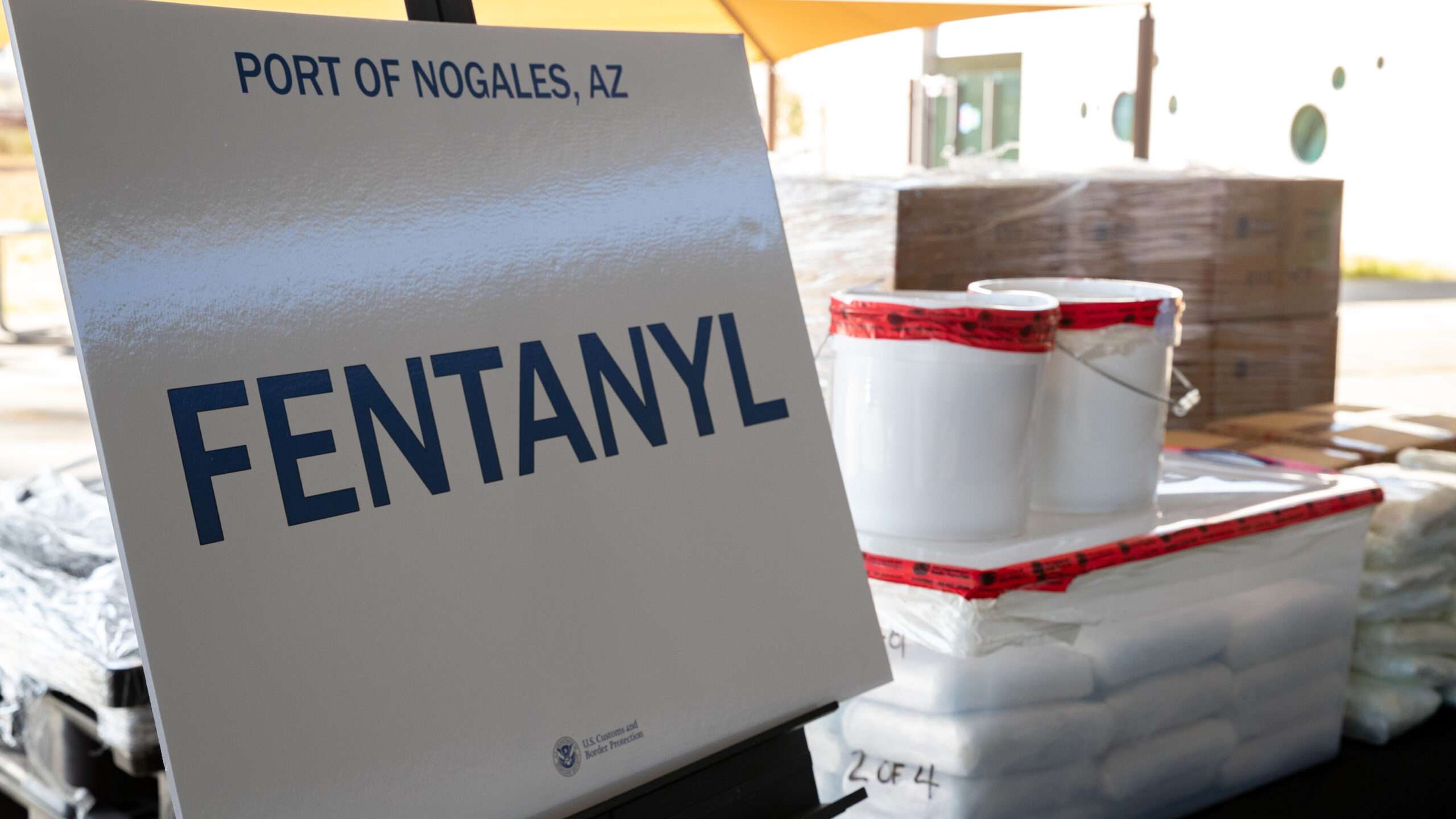WASHINGTON — The Coalition for a Prosperous America (CPA) today released a new “case study” report to Congress that details the alarming extent to which U.S. asset managers and index providers are actively funneling billions of dollars of U.S. investor capital to Chinese Communist Party (CCP) companies, including Chinese firms that have been sanctioned by the U.S. government for human rights abuses and that are helping to modernize China’s People’s Liberation Army (PLA).
The report, titled “Case Study for Congress: BlackRock & MSCI: How Wall Street’s Offshore Companies Fund the CCP & PLA,” provides analytic evidence that BlackRock, the world’s largest asset manager, and MSCI, the world’s foremost index provider, are investing in Chinese military companies and companies sanctioned by the U.S. government for their involvement in Beijing’s ongoing use of forced labor and genocide against the Uyghurs. CPA’s report shows that BlackRock’s offshore funds have about $130 million invested across 14 Chinese Military-Industrial Complex companies listed on the Hong Kong, Shanghai, and Shenzhen stock exchanges—equity positions that would be illegal if held in the United States.
As first reported by The Washington Times, “BlackRock is investing millions of dollars in an estimated 30 Chinese military-linked companies currently sanctioned by the U.S. government” and “companies working on China’s large-scale nuclear weapons buildup.”
CPA’s research shows that leading financial services firms in the U.S. have partnered with state-controlled banks in the People’s Republic of China (PRC). These firms are already using China’s banking network to sell their investment products and services to mainland customers. The PRC benefits from additional capital flows to its stock exchanges while Wall Street earns fees from China’s multi-trillion-dollar asset management market. This symbiotic relationship helps to explain why America’s largest asset managers adamantly refuse to divest from known Chinese military companies and human rights violators despite the innate fiduciary risks.
BlackRock and index provider MSCI represent one side of the Wall Street-Beijing merger. The U.S. House of Representatives is investigating their financing of sanctioned Chinese firms through domestic fund companies. A recent investigation by the House Select Committee on the Chinese Communist Party into BlackRock and MSCI found that these entities are steering billions to blacklisted Chinese companies. The Wall Street Journal reported that they “used billions of dollars of American retirement savings and other investments to buy shares in index funds that included more than five dozen blacklisted Chinese companies.”
Earlier this year, CPA applauded Congresswoman Victoria Spartz (R-IN-05) and Congressman Brad Sherman (D-CA-32) for introducing four pieces of legislation to mitigate the strategic, commercial, and national security threats posed by China to the American economy and financial markets.
This report is further evidence of Wall Street’s actions to undermine the national and economic security of the United States by financing malign Chinese companies that are enabling the CCP’s military and economic threats to the U.S. and our allies. Unless Congress acts, it’s clear that companies like BlackRock and MSCI will always prioritize their profits over our nation’s best interests and continue to support Chinese firms that have been sanctioned by the U.S. government for human rights abuses and that are helping to modernize China’s military.
— Zach Mottl, Chairman of CPA
Specifically, CPA’s report had the following findings:
- BlackRock’s offshore funds are invested in about 30 subsidiaries of Chinese Military-Industrial Complex companies. BlackRock’s foreign subsidiaries invest in companies that form the backbone of China’s defense and aerospace industries.
- Foreign subsidiaries of BlackRock hold Chinese securities that would be illegal to own in the United States. BlackRock’s fund management arms in Hong Kong and Shanghai collectively own $130 million of stock in 14 companies on the Chinese Military-Industrial Complex List maintained by the Treasury Department.
- BlackRock funds own 18 Chinese companies on the Commerce Department’s Military-End User List or Entity List. These companies are subject to special export controls over concerns that any dual-use technology they obtained from the U.S. would be diverted to harmful purposes.
- BlackRock claims to exclude companies involved with nuclear weapons manufacturing despite owning stock in companies that are integral to China’s nuclear weapons program. BlackRock has nearly $200 million dollars invested in companies that help produce nuclear warheads capable of striking the continental United States.
- BlackRock funds own four companies on the Uyghur Forced Labor Prevention Act Entity List. BlackRock holds about $50 million of stock in companies under U.S. sanctions for participating in the PRC’s systematic campaign of oppression against the Uyghurs and other minority groups.
- BlackRock owns about 30 Chinese companies represented in military-themed ETFs traded on mainland exchanges. PRC-based asset managers have issued securities that offer exposure to China’s legacy defense firms as well as military contractors involved in emerging technologies.
- Benchmarks from China Securities Index are steering investor capital toward militarily useful enterprises. By hiring CSI as an index provider, Blackrock and other U.S. asset managers are allocating capital according to Beijing’s strategic priorities.
- BlackRock has formed a joint venture with state-owned China Construction Bank (CCB) to penetrate the mainland’s $9 trillion asset management market. BlackRock’s unprecedented partnership with the PRC’s second largest bank represents a convergence of the CCP and a politically powerful Wall Street firm. This foreign business alliance weakens the U.S. government’s ability to act in the best interest of the American people.
Read the full report here: “Case Study for Congress: BlackRock & MSCI: How Wall Street’s Offshore Companies Fund the CCP & PLA”
Justin Bernier, an advisor to CPA, points out that U.S. financial services firms have teamed up with banks controlled by the CCP.
“Major Wall Street firms have partnered with Beijing through joint ventures that were designed for selling investment products to Chinese investors,” Bernier said. “This symbiotic relationship allows Wall Street to pull management fees out of China’s multi-trillion-dollar investment market while Beijing channels billions of dollars to companies that support the People’s Liberation Army. BlackRock is unlikely to divest from China’s military-industrial complex because doing so could undermine its lucrative business relationship with the CCP. Just the opposite, BlackRock’s joint venture with state-owned China Construction Bank – a scheme to distribute mutual funds online and through thousands of branch offices on the mainland – will send billions of dollars to human rights violators and defense firms at the expense of U.S. national security interests.”
Bernier also noted that the direction of American capital is increasingly directed by the Chinese government.
“China is manipulating capital flows to benefit its strategic priorities, including high-tech defense firms listed on the Shanghai and Shenzhen stock exchanges, by changing benchmarks that determine how index funds are invested,” Bernier continued. “Wall Street firms are increasingly turning to CSI – a company founded and controlled by the Chinese government – to shape their international portfolios. In other words, the CCP now decides how countless Americans invest in overseas markets.”
“The callous disregard for national security and human rights-related risk — much less the abuses of these Chinese corporate bad actors — together with the lack of fiduciary responsibility and diligence on display in this report is very troubling. It’s clear that Congress now has no alternative but to make these kinds of reckless investments by American asset managers illegal to protect our country, fundamental values and retail U.S. investors.” — Roger W. Robinson, former Chairman of the Congressional U.S.-China Economic and Security Review Commission.
# # #













